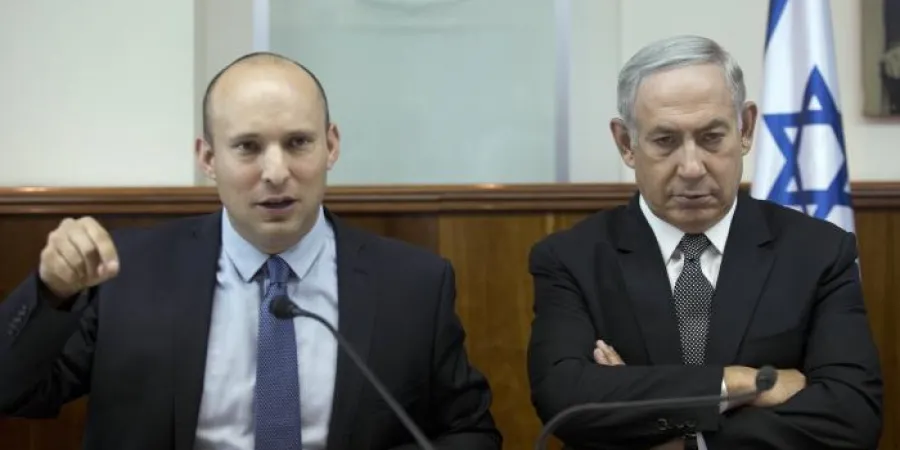Bennett Approves IDF’s “Momentum“ Plan
Approval of the multi-year plan comes following an addition of 2 billion NIS to the IDF's budget. The security cabinet is expected to approve the plan at its next meeting
Or Heller
| 26/01/2020
After agreement was reached between the Defense Ministry and the Finance Ministry on a budget increase for the IDF, Defense Minister Naftali Bennett announced today (Sunday) that he has approved the IDF’s multi-year plan, called “Momentum”. According to an agreement between the IDF, the Defense Ministry and the Finance Ministry, the IDF was granted an additional budget of about 2 billion NIS for a period of two years.
"The plan was presented to the minister by IDF Chief of Staff Lieut. Gen. Aviv Kochavi; Deputy Chief of Staff Maj. Gen. Eyal Zamir; the head of the planning directorate, Maj. Gen. Amir Abulafia; and other senior officers, following a series of discussions dealing with analysis of the IDF’s challenges in the next decade,” the Defense Ministry said. Following the minister’s approval, the plan will be presented for approval by the Security Cabinet at its next meeting, and later presented to the Foreign Affairs and Defense Committee of the Knesset. Besides approving the multi-year plan, Minister Bennett approved a series of decisions on the IDF’s readiness for battle on various fronts: acquisition of weaponry, development of new capabilities, improvement of training, the IDF’s organization, and the terms of those serving in the IDF, among others.
“The ‘Momentum’ multi-year plan is intended to create a more flexible, smarter and deadlier IDF. The plan is based on the principle of quickly and powerfully defeating the enemy on multiple and complex fronts. The plan uses the advantages of the State of Israel and its power, while taking a discerning view of the challenges and risks, first and foremost the Iranian threat. We will not be deterred. On the contrary, we will continue to act, at any time and anywhere,” Bennett said.
Approval of the multi-year plan comes following an addition of 2 billion NIS to the IDF's budget. The security cabinet is expected to approve the plan at its next meeting
Or Heller
| 26/01/2020
After agreement was reached between the Defense Ministry and the Finance Ministry on a budget increase for the IDF, Defense Minister Naftali Bennett announced today (Sunday) that he has approved the IDF’s multi-year plan, called “Momentum”. According to an agreement between the IDF, the Defense Ministry and the Finance Ministry, the IDF was granted an additional budget of about 2 billion NIS for a period of two years.
"The plan was presented to the minister by IDF Chief of Staff Lieut. Gen. Aviv Kochavi; Deputy Chief of Staff Maj. Gen. Eyal Zamir; the head of the planning directorate, Maj. Gen. Amir Abulafia; and other senior officers, following a series of discussions dealing with analysis of the IDF’s challenges in the next decade,” the Defense Ministry said. Following the minister’s approval, the plan will be presented for approval by the Security Cabinet at its next meeting, and later presented to the Foreign Affairs and Defense Committee of the Knesset. Besides approving the multi-year plan, Minister Bennett approved a series of decisions on the IDF’s readiness for battle on various fronts: acquisition of weaponry, development of new capabilities, improvement of training, the IDF’s organization, and the terms of those serving in the IDF, among others.
“The ‘Momentum’ multi-year plan is intended to create a more flexible, smarter and deadlier IDF. The plan is based on the principle of quickly and powerfully defeating the enemy on multiple and complex fronts. The plan uses the advantages of the State of Israel and its power, while taking a discerning view of the challenges and risks, first and foremost the Iranian threat. We will not be deterred. On the contrary, we will continue to act, at any time and anywhere,” Bennett said.
Rare-earth elements between the United States of America and the People's Republic of China
The Eastern seas after Afghanistan: the UK and Australia come to the rescue of the United States in a clumsy way
The failure of the great games in Afghanistan from the 19th century to the present day
Russia, Turkey and United Arab Emirates. The intelligence services organize and investigate



